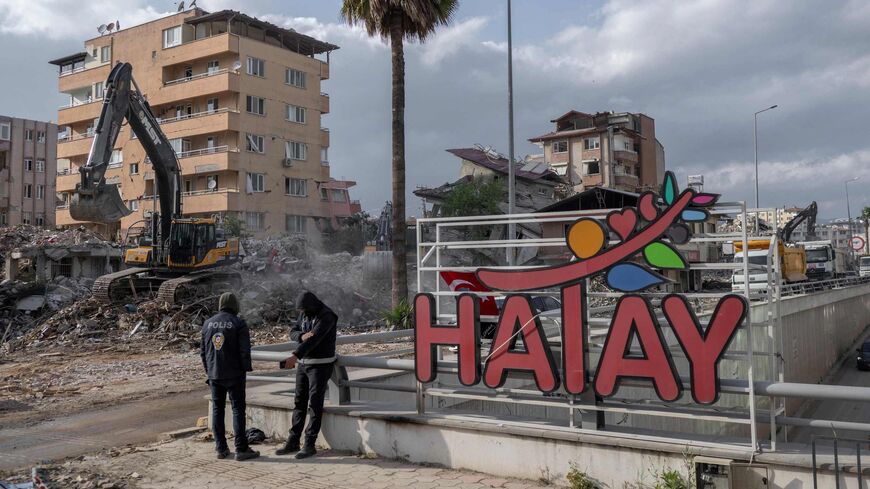ISTANBUL — While Turkey fights to return its earthquake-hit provinces to a semblance of normality, questions about the viability of next month’s elections in the southern region are growing increasingly urgent.
The mayor of Hatay, the worst-hit of 11 provinces in the disaster zone, questioned Wednesday why the city’s airport will be closed until after the May 14 polls, preventing voters from returning to cast their ballots.
Lutfu Savas, who represents the Republican People’s Party (CHP) that leads the Nation Alliance opposition bloc, said it was not possible to book flights to Hatay Airport.
“Everyone is wondering why tickets cannot be bought to Hatay until May 17,” he said in a statement to Cumhuriyet. “If there is a problem with the runway, let them explain it; otherwise they should tell us why the planes cannot land full of passengers.”
Hatay airport’s runway was destroyed in the quakes that struck on Feb. 6 but reopened a week later for cargo planes carrying aid and commercial passenger flights.
Savas added, “Our citizens want to go back and vote. More than two months have passed since the earthquake. While flights should have been made more frequent than before, the flights were stopped.”
According to a tweet by HaberTurk journalist Sevilay Yilman, Savas told her that at least 500,000 Hatay voters were away from the province and suggested their absence would harm the opposition alliance.
A report from the UN Office for the Coordination of Humanitarian Affairs published Monday said at least 3 million people have relocated from their homes in the quake zone, many of them heading to other parts of Turkey.
In the week after the Feb. 6 quakes, more than 2 million left the region, according to President Recep Tayyip Erdogan’s office, a number that rose to 3.3 million by March.
Erdogan, who is facing the most closely contested polls in his 20-year tenure, announced last month that the presidential and general elections would go ahead in May despite the chaos caused by earthquakes that killed more than 50,000 people and left millions homeless.
Ahmet Yener, head of the High Election Board, said Monday that at least 133,000 people affected by the earthquakes will vote outside their home provinces. Election officials are visiting the earthquake region to oversee preparations, he told reporters.
The board previously said the elections would be facilitated through ballot boxes set up in temporary shelters and by allowing those who had moved away to easily change their registered address.
However, there are fears that voters who left their home provinces will encounter difficulties in voting or that irregularities in voting or ballot counting will go unchecked in the stricken region, which has been under a state of emergency that is due to expire on May 7.
The state of emergency “significantly” curtails freedoms of assembly, association, expression and press for nearly one-sixth of the country’s population, according to Soner Cagaptay, director of the Turkish Research Program at The Washington Institute.
“In addition to the nationwide restrictions on liberty that [Erdogan’s] government had already instituted before the disaster, [a state of emergency] would render the campaign distinctly unfree and unfair,” he added.
In a statement following the last parliamentary and presidential elections in 2018, observers from the Organization for Security and Co-operation in Europe noted unequal campaigning conditions. Erdogan and his ruling Justice and Development Party (AKP) enjoyed “an undue advantage, including in excessive coverage by government-affiliated public and private media outlets.”
The state of emergency imposed after a 2016 coup attempt ended days before polling day, also restricting the media and freedoms of assembly and expression, the observers said.
They added that “important legally prescribed steps were often omitted” during the ballot count. “The restrictions we have seen on fundamental freedoms have had an impact on these elections,” said Ignacio Sanchez Amor, leader of the observer mission.
Similar concerns face election monitors ahead of next month.
A decision by the election board during a 2017 referendum that transitioned Turkey to a presidential system allowed unsealed ballot papers to be considered valid, contradicting election law.
Turgut Kazan, former president of the Istanbul Bar Association, described the decision, which still stands, as “completely unlawful and arbitrary.”
Meanwhile, Adem Sozuer of Istanbul University’s law faculty said voters had lost confidence in the High Election Board.
“There is widespread suspicion in a significant part of society that elections will be rigged,” he said. Changes to election law seen as favoring the AKP and the removal of senior judges as the heads of local election boards also “raised suspicions,” Sozuer said.
Erdogan and his ministers have been allowed to harness state resources during the campaign while the election authorities “turned a blind eye to this illegality.”
Sozuer added, “The most important thing to do now is to prepare to prevent fraud and irregularities on and after the voting day.”







